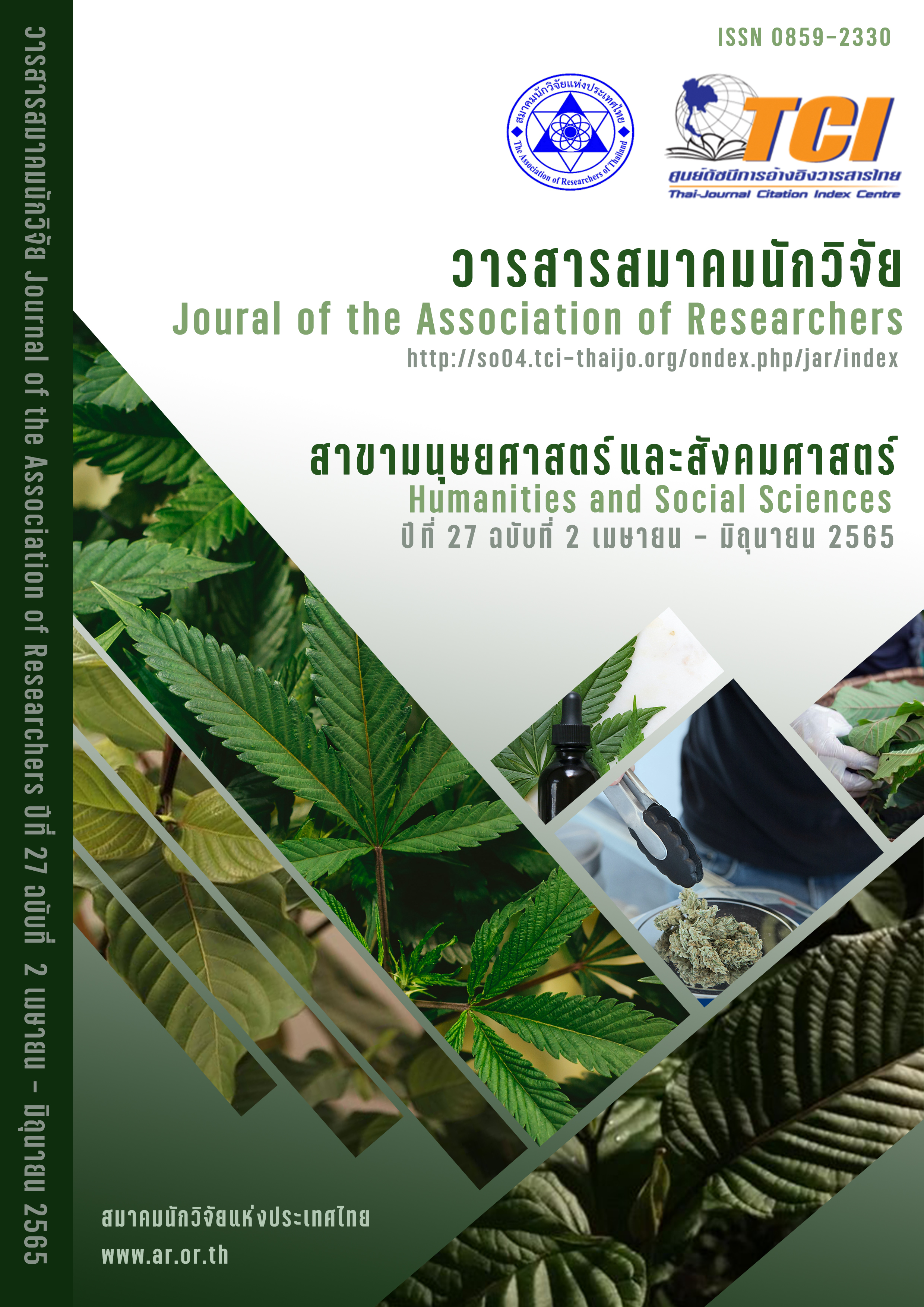Corporate Social Responsibility and Attributes of Thai Traditional Medicine/Alternative Medicine Selected by Consumers for Using Thai Traditional Medicine, Alternative Medicine, and Medical Cannabis in Bangkok Metropolitan
Main Article Content
Abstract
The objectives of this research were 1) to study consumer behavior in using Thai Traditional Medicine/Alternative Medicine (TTM/AM) 2) to study corporate social responsibility variables of TTM/AM 3) to study attributes of TTM/AM and 4) to study relationships between corporate social responsibility and marketing mix with using TTM/AM. Four hundred and fifty questionnaires were collected by judgmental sampling. Most of respondents were female, less than 25 and more than 45 years old, bachelor’s degree, private sector employee, income of 25,001 – 35,000 baht per month, and single. Analyze and present descriptive statistics.
The research results indicated that consumer use the first five TTM/AM treatments composed of Thai Traditional massage, herbal sauna, medical cannabis, aroma therapy, and macrobiotics. Health problems which consumer to consult were insomnia, stress, back pain, migraine, and paralysis. The after-treatment results were better than using TTM/AM. The consumer weight product attributes of TTM/AM for treatment method, reputation of TTM/AM, price, and tools and equipment. Moreover, corporate social responsibility variables were standard of service quality, focusing patient than profit, code of conduct, customer responsiveness, supporting to social activities, and sharing knowledge to community. Finally, factors affecting to using decision-making were corporate social responsibility, products and services, and marketing promotion.
Article Details

This work is licensed under a Creative Commons Attribution-NonCommercial-NoDerivatives 4.0 International License.
บทความที่ปรากฏในวารสารนี้ เป็นความรับผิดชอบของผู้เขียน ซึ่งสมาคมนักวิจัยไม่จำเป็นต้องเห็นด้วยเสมอไป การนำเสนอผลงานวิจัยและบทความในวารสารนี้ไปเผยแพร่สามารถกระทำได้ โดยระบุแหล่งอ้างอิงจาก "วารสารสมาคมนักวิจัย"
References
ขวัญชนก เทพปัน และคณะ. (2560). การตัดสินใจเลือกใช้บริการแพทย์แผนไทยของประชาชนผู้มาใช้บริการที่โรงพยาบาลทั่วไป จังหวัดราชบุรี. วารสารวิทยาลัยพยาบาลพระปกเกล้า จันทบุรี. 28(2), 80-92.
คมสัน ทินกร ณ อยุธยา. (2562). หลักการพื้นฐานของการแพทย์แผนไทย ในราชสกุลทินกร. (พิมพ์ครั้งที่ 3). นนทบุรี: วิชั่น พรีเพรส.
จิราพร ลิ้มปานานนท์ และคณะ. (2551). การบูรณาการการแพทย์แผนไทย: ระบบยาไทยและยาจากสมุนไพรในสถานบริการสาธารณสุข. กรุงเทพฯ: กรมพัฒนาการแพทย์แผนไทยและการแพทย์ทางเลือก.
ญาดา เรียมริมมะดัน. (2558). แนวทางการพัฒนาความรู้ เจตคติ และพฤติกรรมการรักษาด้วยวิธีการแพทย์แผนไทยในโรงพยาบาลเจ้าพระยาอภัยภูเบศร จังหวัดปราจีนบุรี. วารสารราชนคินทร์. กรกฎาคม-ธันวาคม, 169-178.
ณัฐวรรณ วรพิสุทธิวงศ์. (2554). ปัจจัยที่มีความสัมพันธ์กับพฤติกรรมการดูแลสุขภาพตนเองด้วยการแพทย์แผนไทยของบุคลากรมหาวิทยาลัยราชภัฎสวนสุนันทา. กรุงเทพ: มหาวิทยาลัยราชภัฎสวนสุนันทา.
ทรงเดช มโนจินดา. (2557). ปัจจัยที่นำไปสู่การส่งเสริมแพทย์ทางเลือก. ดุษฎีนิพนธ์ มหาวิทยาลัยรามคำแหง.
เทวัญ ธานีรัตน์. (2551). การแพทย์ทางเลือก คืออะไร. วารสารสำนักการแพทย์ทางเลือก. ปีที่ 1, กันยายน-ธันวาคม, 7-10.
พิพัฒน์ นนทนาธรณ์. (2559). การจัดการความรับผิดชอบต่อสังคมขององค์กร: การสร้างข้อได้เปรียบในการแข่งขันอย่างยั่งยืน. กรุงเทพฯ: ศูนย์ผู้นำธุรกิจเพื่อสังคมแห่งมหาวิทยาลัยเกษตรศาสตร์.
พิพัฒน์ นนทนาธรณ์. (2561) รวมบทความว่าด้วย...ความรับผิดชอบต่อสังคม. กรุงเทพ: ศูนย์ผู้นำธุรกิจเพื่อสังคมแห่งมหาวิทยาลัยเกษตรศาสตร์.
พุทธินันท์ พินศิริกุล. (2554). ปัจจัยที่มีผลต่อการยอมรับการใช้บริการทางการแพทย์แผนไทยประเภทการนวดไทยของประชาชนในอำเภอเมือง จังหวัดบุรีรัมย์. วิทยานิพนธ์ มหาวิทยาลัยศิลปากร.
รัฐธรรมนูญแห่งราชอาณาจักรไทย. (2560, เมษายน 6). ราชกิจจานุเบกษา, 134(40 ก) , 1-90.
สถาบันธุรกิจเพื่อสังคม. (2551). เข็มทิศธุรกิจเพื่อสังคม. กรุงเทพฯ: สถาบันธุรกิจเพื่อสังคม.
เสาวภา ชูวา และคณะ. (2563). การตัดสินใจเลือกใช้บริการแพทย์แผนไทยของผู้สูงอายุในโรงพยาบาลสังกัดกรุงเทพมหานครแห่งหนึ่ง. การประชุมทางวิชาการระดับชาติวิทยาลัยนครราชสีมา ครั้งที่ 7, 422-431.
Carroll, A. B. (1991). The pyramid of corporate social responsibility: Toward the moral management of organizational stakeholders. Business Horizons, July-August, 39-48.
Backes, M. (2017). Cannabis pharmacy: The practical guide to medical marijuana. New York: Black Dog & Leventhal Publishers.
Blesching, U. (2015). The cannabis health index, Combining the science of medical marijuana with mindfulness techniques to heal 100 chronic symptoms and diseases. Berkley, California: North Atlantic Books.
Harrison, E. F. (1981). The managerial decision-making process. Boston: Houghton Mifflin.
Kotler, P. & K. Keller. (2012). Marketing management: (14th ed.). Boston: Pearson.
Porter, M. & M. Kramer. (2006). Strategy & society: The link between competitive advantage and corporate social responsibility. Harvard Business Review, December.
Translated Thai References
Constitution of the Kingdom of Thailand. (2017, April 6). Ratchaketjanubeksa, 134(40 A), 1-90.
Corporate Social Responsibility Institute. (2008). Business Compass for Society. Bangkok: Corporate Social Responsibility Institute.
Lumpananan, J. et al. (2008). Integrated Thai traditional medicine: System of Thai medicine and herbal medicine in public healthcare. Bangkok: Department for Thai traditional and alternative medicine.
Tinakorn Na Ayutthaya.K. (2019). Principle of traditional Thai medicine. (3rd Ed.). Nonthaburi: Vision Prepress.
Theppan K. et al. (2017). Decision making on the utilization of Thai Traditional Medicine in general hospital, Ratchaburi province. Journal of Phrapokklao Nursing College. 28(2), 80-92.
Worapisuttiwong.N. (2011). Factors relating self-care behavior concerning Thai Traditional Medicine of Suan Sunandha Rajabhat University personnel. Bangkok: Suan Sunandha Rajabhat University.
Nonthanathorn.P. (2016). Corporate social responsibility management. Bangkok: Social Enterprise Leadership Center of Kasetsart University.
Nonthanathorn.P. (2018) Article collection…social responsibility. Bangkok: Social Enterprise Leadership Center of Kasetsart University.
Pinsirigul.P. (2011). Factors affected the acceptances of Traditional Thai Medicine in Thai Massage of people in Muang district, Buri Ram province. Thesis: Silpakorn University.
Chuwa S.et al. (2020). Decision making by elderly people on the use of Thai Traditional Medicine in Bangkok Metropolitan area hospital. The 7th National Conference Nakhonratchasima College, 422-431.
Manojinda. S. (2014). Factors enhancing alternative medicine services. Dissertation Ramkhamhaeng University.
Thaneerat.T (2008). What is alternative medicine? Journal of Alternative Medicine Bureau. Vol 1, September-December 7-10.
Riumrimmadun. Y. (2015).Guidelines for developing knowledge, attitude, and Thai Traditional Medicine behavior at Chaophaya Abhaibhubejhr hospital, Prachinburi province. Journal of Rajanagarindra. July-December, 169-178.


